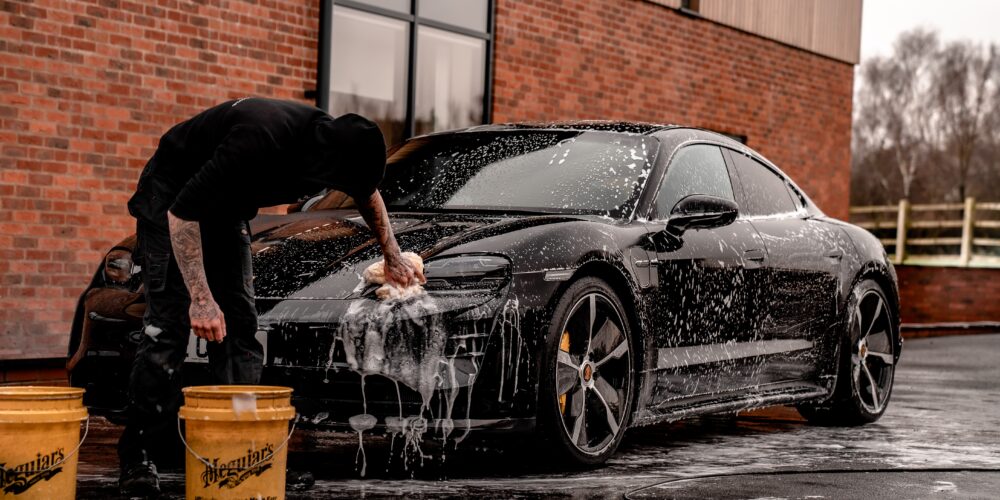You wouldn’t think that splashing a bit of water on your car and giving it a good scrub could lead to costly repairs, but the reality is that it can! With the wrong tools, cleaners and techniques, you could cause lasting bodywork damage or wear and tear to your vehicle that could ultimately have been avoided. From washing your car on a bright, hot day, to using household cleaners for your vehicle, we’ve pulled together a list of some car cleaning mistakes you could be making that might end up costing you in the long run.
Washing Your Car In Hot Weather
It’s a well-agreed opinion amongst professional car cleaners and detailers that washing a car in hot weather, or even when the car itself is hot after a long journey, should be avoided where possible. Washing your car in direct sunlight could not only be bad for the finish of the clean, but it also makes the process much harder and can lead to soap, water or even dirt and debris building up and staining the paintwork. If it’s hot enough, you may even notice swirl marks within the paint after washing. For those wanting to maintain a smooth and blemish-free paint job, washing your car on a hot day could lead to costly bodywork repairs later down the line.
Using Abrasive Brushes and Sponges
This one might seem obvious, but it’s surprising how few people know the damage that a scourer or even just a kitchen sponge can cause when cleaning your car. While it can be tempting to pick up the rough side of a kitchen sponge to battle the tougher, more stubborn dirt on your vehicle, you may actually just be putting your car’s bodywork at risk. Paint correction can be costly depending on the area of damage, so it’s best to avoid this completely by only using car-specific sponges, brushes and mitts.
Using Household Cleaning Products
While a bit of washing up liquid and a spritz of anti-bacterial spray may seem harmless, using household cleaning agents on your car could actually do more harm than good. Washing up liquid, for example, could strip the natural oils and waxes that protect your car’s paintwork and while it won’t pose an immediate problem, it can lead to premature paint damage or rusting. Similarly, using household cleaners on the interior of your vehicle could be more abrasive or bleaching than you might expect. You should avoid using any sprays or solutions that have high alcohol content, particularly if you have leather seats, and should spot-clean any stains rather than soaking your whole seats to avoid damaging the fibres. You can also use car-friendly cleaners and shampoos for additional safety.
Visiting Automatic Car Washes
Automatic car washes can seem like a quick and convenient way to get your car sparkling when you’re short on time, but some of them could be doing damage to your car. Many of these car washes use older systems that have nylon brushes and other equipment that could prove to be abrasive for your vehicle. While this certainly isn’t the case for every automatic car wash, avoiding the risk can help you protect your paintwork for longer.
Not Using Two Buckets
Using just one bucket when washing may seem like standard practice, but using two is actually far more efficient and effective. You should have one bucket with the usual shampoo and water mix, and another with clean hot water that you can use to rinse out the sponge, brush or mitt. When washing your vehicle, the sponge, mitt or brush can pick up dirt as you go and when re-dipping into the soapy water, you keep that dirt clinging to the surface. This can lead to scratches on the surface of the painwork, if not just a poor clean! Having the second bucket gives you water to rinse out your sponges and brushes properly, meaning you can dip back into the soapy water with the knowledge that it’s clean.
Not Cleaning The Wheel Arches Or Underside Of The Car
It can be easy to overlook the parts of your vehicle that you can’t see when it comes to washing your car, but the underside and wheel arches are some of the most important parts to clean across the whole vehicle. These are the dirtiest parts of the car and without proper and regular cleaning, this dirt can build up and ultimately damage the bodywork of your vehicle. Salt, mud and other debris can build up and lead to rusting or mould which are far harder and more expensive to fix than a quick wash!
Cleaning The Wheels Last
Cleaning from the top to the bottom is usually the best way to clean a car to ensure that no dirt from the top can drip down onto an already clean lower part of the vehicle. However, the wheels are the exception to this rule! As they are some of the dirtiest and most stubborn parts of the vehicle, cleaning them can lead to splashback, specks of dirt and more, which is why you should always clean them first. You can always give them another rinse after you finish up the rest of your vehicle to rinse off any dirt that has accumulated.
For more car washing advice or for information about our bodywork repairs, we are on hand to help. Simply get in touch with a member of our team, today.

